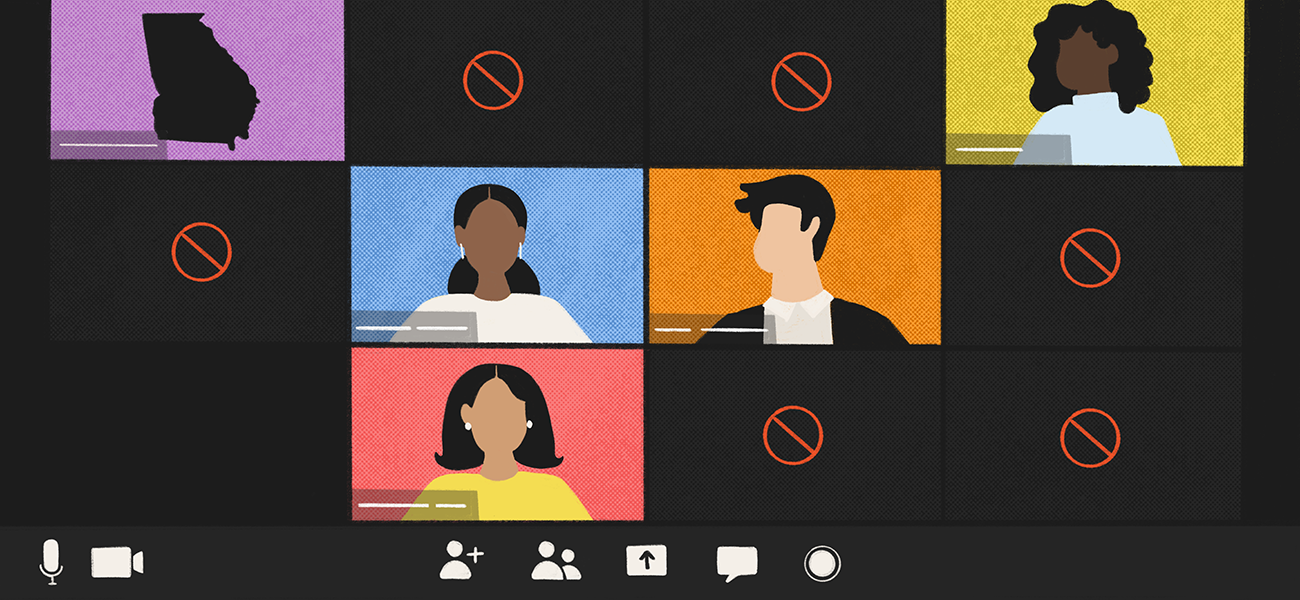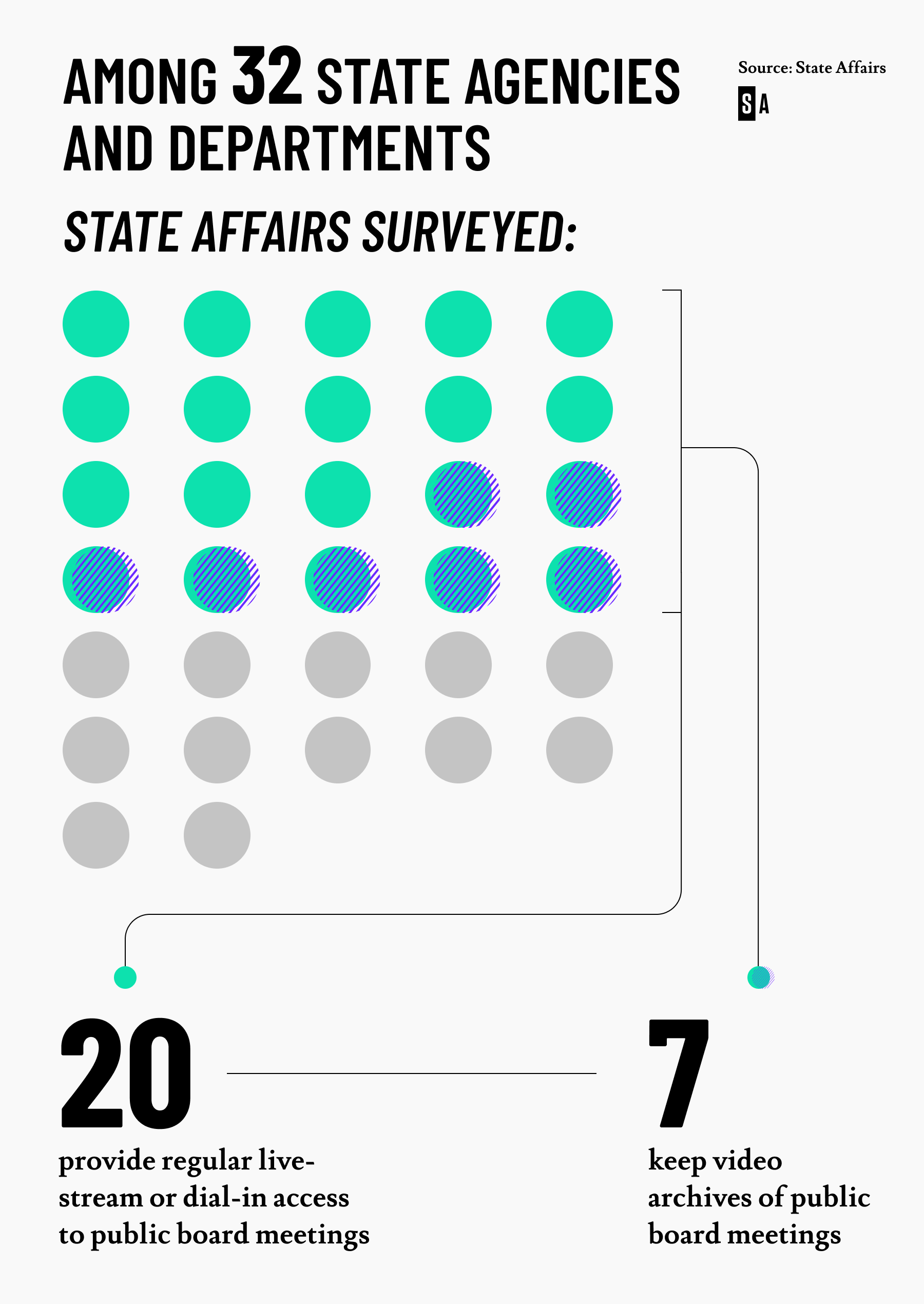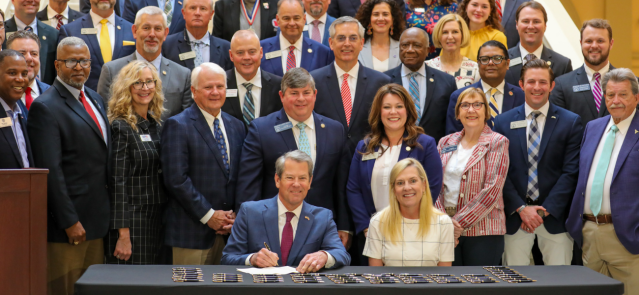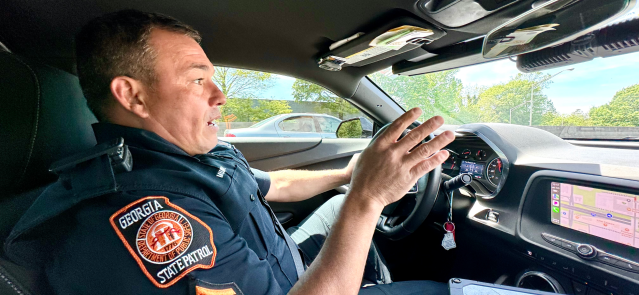Stay ahead of the curve as a political insider with deep policy analysis, daily briefings and policy-shaping tools.
Request a DemoLack of Virtual Access to Public Meetings Denies Millions of Georgians a Voice

Illustration by Brittney Phan
- 12 out of the 32 largest state agencies don’t provide regular virtual access to public board meetings.
- Just 7 out of the 32 largest state agencies keep a video archive of their board meetings.
- Lack of virtual access cuts out millions of Georgians who can’t commute to in-person meetings and impacts persons with disabilities the most.
Nearly a third of Georgia’s largest state government agencies and departments don’t provide virtual or dial-in access to the public for board meetings, according to an investigation by State Affairs. And the vast majority do not keep video or audio records of those meetings.
While the COVID-19 pandemic spurred the transition from offices to remote work for millions and made video-conferencing and virtual meetings a staple of daily life, only certain state agencies seem to have embraced the opportunity to make public participation in government as easy as a button click.
“Trust in government institutions is at an all-time low,” said Richard T. Griffiths, president emeritus of the Georgia First Amendment Foundation. “One of the best ways to rebuild trust is to make government as transparent as it can be, so whatever steps can be taken to allow the public to see what's going on helps that.”
State law only requires agencies to give public notice for the date, time and location of meetings and for written minutes to be available upon request. Still, it’s a gap in transparency and accessibility that effectively cuts out millions of Georgians from easily watching the business of their government and providing public comment without commuting for hours to meeting locations. Meanwhile, those state agencies that do live-stream their meetings and keep video archives told State Affairs the cost to do so is effectively zero.
State Affairs found only seven state agencies or departments that kept video and audio archives of their meetings online. Griffiths said the lack of archived recordings left him “disappointed.”
“The technology is there. It's simple, it's easy, it costs almost nothing. And for so few of those agencies to record it and make it available later. It certainly is disappointing,” Griffiths said.

Illustration by Brittney Phan for State Affairs.
And while the pandemic isn’t over, amid a push to return to “normal” some agencies are in fact removing virtual access, including the state Department of Natural Resources (DNR), which last week said its next meeting in Atlanta would only be in-person.
Donald Kirkland, a spokesman for the agency, told State Affairs that the decision to stop streaming board meetings was “based on several factors including staffing challenges, frequent off-site meetings within our DNR properties (that contain limited wifi and cellular access), in addition to complaints over technical glitches regarding volume.”
Because DNR meetings are sometimes held in remote locations inside state parks, rather than the Atlanta offices, connectivity can be an issue, Kirkland said. But the glitches and technical difficulties mainly arose from the challenge of hybrid meetings.
“The determination was made that the only way to guarantee full compliance with Georgia open meeting standards is by in-person participation,” he said, noting that some meetings do have partial audio recordings that can be requested.
While the technology is seemingly cheap and available, Griffiths, of the Georgia First Amendment Foundation, noted that hybrid meetings do pose the greatest technical challenge.
“While it has certainly been a huge benefit for us to be able to see these statewide meetings remotely, the return to in-person meetings puts it back on the public to actually show up in the meetings and hear and see what's going on. Because the agencies very often don't have the resources, the technical savvy or frankly the inclination to go through the hassle of doing that hybrid type of meeting,” he said.
It should be noted that DNR isn’t alone in transitioning away from virtual meetings. The Georgia Department of Economic Development stopped live streaming in August. David Sofferin, the spokesperson for the Department of Behavioral Health and Developmental Disabilities (DBHDD), said that live-casting board meetings is a temporary measure. “We will eventually go back to meeting in person.”
While agendas, summaries and minutes are archived, there are no recordings of the livestreams. DBHDD already used the WebX platform for their video-conferencing needs, so webcasting board meetings came at no cost, according to Sofferin.
The state’s Department of Transportation (GDOT) and Department of Public Health are among the few that provide virtual access to public meetings and keep an archive of recordings, and both indicated that doing so came at no extra cost.
“There is no additional cost to GDOT to record and archive the Board meetings. As part of our subscription to (Microsoft) Teams the functionality exists to record the Board meetings,” GDOT told State Affairs in an email.
Public participation in such meetings varies substantially, sometimes there is none, though the video archives of agencies that do keep recordings show that hundreds of Georgians do tune in to a given meeting. If hundreds of people tried to show up in person, it would necessitate a larger meeting venue. What’s more, without virtual access, a resident in Brunswick or Savannah would have to drive several hours each way to attend a meeting in Atlanta, assuming they have a car. A Brunswick resident taking a greyhound bus to the capital is looking at an 8 to 11-hour trip each way.
But virtual participation in meetings also opened up easy access to government to Georgians with disabilities like never before.
Devon Orland, Litigation Director for the Georgia Advocacy Office, the designated body for advocacy and protection of persons with disabilities, emphasized that the law’s requirements on public meetings are minimal, but does include a provision for “reasonable accommodation” for those persons for whom attending a public meeting may otherwise be impossible. Agencies may provide dial-in or virtual access to a meeting if contacted beforehand on an ad-hoc basis, still, this is less convenient than having that access as a matter of policy and practice.
“In a perfect world, it would be available and accessible. And adding a streaming component makes it more accessible,” she said.
“Georgia does not have a robust system of paratransit,” Orland added. “People who don't drive or don't have access to somebody who drives them places and, by reason of their disability can't leave their community… the only way they can participate in government is virtually,” Orland said.
It should be noted that state agency representatives State Affairs spoke to, including at DNR, indicated a willingness to make an accommodation for virtual participation upon request.
For Griffiths, the level of transparency agencies provide is ultimately a reflection on their leadership.
“A lot of agencies were very proactive about being as transparent as they could be during the pandemic and others, frankly, were not. And it's all about the leadership in those institutions. And I think you would be able to look at your list and quickly figure out who had leadership and enthusiasm for making sure the public knew what was going on,” he said.
Should public meetings of state government agencies and departments provide the public with livestream access? Should recordings be kept and made accessible online as a matter of practice? Share your thoughts and feedback by email to [email protected] or on Twitter @alemzs.
Read this story for free.
Create AccountRead this story for free
By submitting your information, you agree to the Terms of Service and acknowledge our Privacy Policy.
Kemp signs bills on education, health care, taxes
Gov. Brian Kemp signed a slew of bills over the past week or so, including the private school voucher bill long sought by Republicans and a bill that will ease regulations over the construction and expansion of medical facilities in rural areas. His bill-signing events were clustered into themes: education, health care, military members, human …
Incumbent candidates for local, federal races likely to be no-shows at this weekend’s primary debates
ATLANTA — One of Georgia’s prominent media organizations is pleading with incumbent state and congressional candidates to participate in its primary election debates slated for Sunday.
For the first time in The Atlanta Press Club’s 30-year debate history, incumbents facing challengers in the May 21 primary have either declined or not yet committed to participating in the organization’s well-known debate series. The possible no-shows include candidates in four Congressional races as well as the Georgia Supreme Court, and the Fulton County District Attorney races.
“This is the first time that we’ve had so many [incumbents] not participate,” debate organizer Lauri Strauss told State Affairs. Strauss declined to speculate why candidates aren’t participating.
Hoping to encourage more participation, the organization issued the following statement:
“The Atlanta Press Club believes it is the responsibility of people running for public office to answer questions from their local media that will help inform voters before they cast their ballots. If a candidate is running for public office, the candidate should be willing to participate in the democratic process, which includes attending debates and fielding questions from journalists and opponents.”
Candidates have until Friday to RSVP.
Strauss said candidates who fail to appear will be represented on stage by an empty podium during the debate.
District Attorney Fani Willis has declined to participate and Democratic U.S. Reps. Lucy McBath and David Scott have yet to RSVP. Strauss said the organization is still in talks with Georgia Supreme Court Justice Andrew Pinson’s staff about his appearance in the debate.
Willis, declined earlier this week to participate, citing constraints around talking about sensitive cases like the criminal prosecution of former President Donald Trump.
McBath currently represents the 7th Congressional District and is now running in the newly drawn 6th Congressional District against two Democratic challengers, Jerica Richardson and Mandisha Thomas. McBath declined to participate in the press club’s general election debate in 2022, forcing her Republican challenger Mark Gonsalves to debate with an empty podium. McBath won with 61% of the vote.
The debates will air live on April 28 on GPB.org, on The Atlanta Press Club’s Facebook page (www.fb.com/TheAtlantaPressClub). It will be rebroadcast in early May on WABE.org.
| Race | Tape and Livestream Sun. April 28 |
GPB-TV Broadcast | WABE Broadcast |
| Congressional District 6 Democrats | 10:00 a.m. | April 29 at 7:00 p.m. | May 1 at 4:30 p.m. |
| Congressional District 13 Democrats | 11:15 a.m. | April 28 at 4:00 p.m. | May 1 at 5 p.m. |
| Congressional District 3 Republicans | 1:00 p.m. | April 28 at 5:00 p.m. | May 2 at 3:30 p.m. |
| Congressional District 2 Republicans | 3:00 p.m. | April 29 at 5:00 p.m. | |
| Georgia Supreme Court | 4:45 p.m. | May 2 at 4:30 p.m. | |
| DeKalb County CEO | 5:45 p.m. | May 2 at 5:15 p.m. | |
| Fulton County District Attorney | 6:45 p.m. | May 1 at 4 p.m. |
Have questions or comments? Contact Jill Jordan Sieder on X @journalistajill or at [email protected] and Tammy Joyner on X @lvjoyner or at [email protected].
And subscribe to State Affairs so you do not miss an update.
X @StateAffairsGA
Instagram@StateAffairsGA
Facebook @StateAffairsGA
LinkedIn @StateAffairs
‘It is nothing short of insane:’ Bill to criminalize squatting signed by governor
ATLANTA — Today Gov. Brian Kemp signed legislation criminalizing squatting, the illegal practice of entering and residing on someone else’s property without their consent. The Georgia Squatter Reform Act makes squatting a misdemeanor criminal offense, punishable by up to a year in jail, a $1,000 fine, or both. It also speeds up the timeline to …
State troopers are stretched to fight drugs and curb highway deaths
ATLANTA — When Cpl. Anthony Munoz straps on his bullet-proof vest each day and pulls out of the Department of Public Safety headquarters in Atlanta, Munoz never knows how his shift will unfold. What is for certain is that the traffic — of cars, criminals and contraband — is constant. And what is also true …




